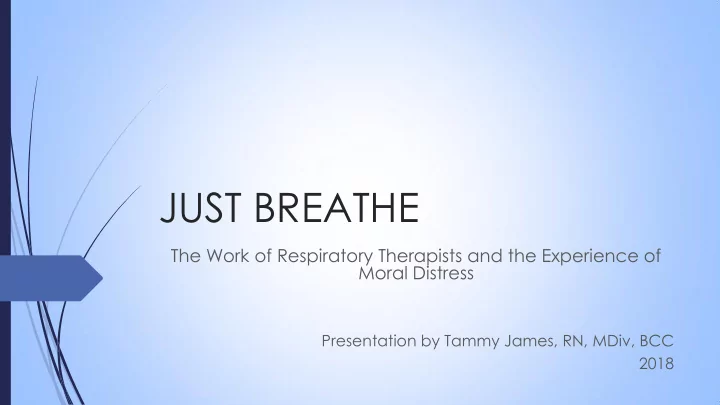

JUST BREATHE The Work of Respiratory Therapists and the Experience of Moral Distress Presentation by Tammy James, RN, MDiv, BCC 2018
Sacred Breath
Sacred – a bridge between the body and the spirit
The animating force of God. That which is LIFE (without breath, one dies)
In Hindu scriptures, breath connects one to the universal soul.
Hebrew scriptures – breath equated with life and was given to humankind by God
RESPIRATORY THERAPISTS Maintainers of BREATH Cleaners of AIRWAYS Managers of BREATHING YOUR WORK IS VITALLY IMPORTANT
All in a days work …
Moral Distress What is moral distress? Who experiences moral distress? What do you do about it?
Moral Distress Defined …the painful feelings and psychological disequillibrium experienced when you know the ethically appropriate action to take, but you are unable to act upon it because of obstacles and restraints. ...you are forced to act in a manner contrary to your personal and professional values which undermines your integrity and authenticity. (Jameton, 1984)
Moral Distress You know the ethically correct action to take but you feel powerless to take that action. (Epstein, 2013).
Causes of Moral Distress Unnecessary or seemingly futile care provided which prolongs dying process Lack of consensus regarding treatment plan or poor team communication regarding goals of care Lack of continuity of care Working with colleague who is not as competent as care requires
Causes of Moral Distress Providing care that is not in the best interest of the patient Providing inadequate pain relief Disregarding patient’s wishes Providing false hope or lack of truth-telling Inappropriate use of resources Corley (1995); Epstein & Hamric (2009); Hamric, Epstein, White (2013); Wilkinson (1988)
Who experiences Moral Distress? EVERYONE in the healthcare profession Situational – “This is so wrong”; “This doesn’t feel right to me”; “Why is the doctor doing this?” “What is wrong with this family?” According to the patient’s Advance Care Plan/ Advance Directive/Living Will he/she would not want us to do this! Why are we doing this?
Reflections Groups of two – (3-4 minutes each) Each person share a patient care situation in which you have experienced moral distress.
Consequences of Moral Distress
Consequences of Moral Distress Disenchantment with work Leave position Burnout Anger Depression Guilt A sense of helplessness Psychological Exhaustion Physical Symptoms Wiegand & Funk (2012); Elpern, Covert & Kleinpell (2005); Epstein & Hamric (2009)
What do we do about Moral Distress? Create moral space within workspace: Consult chaplain services for support Utilize Palliative Care services to enhance team collaboration and clarify goals of care Schedule regular family meetings to improve communication Attend Interprofessional daily rounds (IDT, IPOC) Provide Moral Distress Consult Service
Purpose of Moral Distress Consult To create a moral space for reflection and reduce moral distress among staff (greater job satisfaction, improve employee retention) To empower staff to raise concerns (healthier and happier staff) To provide an inter-professional avenue for open discussion and problem solving To assist staff in developing strategies to address barriers to high-quality patient/family care
Moral Distress Consult Acknowledge & Validate your feelings Affirm your professional responsibility to act Request consult – Moral Distress Consult or Ethics Committee consult Epstein & Hamric (2009)
Determine Origin of Moral Distress What are the barriers? Personal – compromise of own values, beliefs and integrity Unit – constraints due to issues within your unit Organization – constraints due to administration or institutional limits and mandates
What am I feeling? What is my personal power in this situation? Speak out What is our unit’s power? Problem solve w/team What is our organization’s power? Send it up the chain
Moral Distress Resolution Where does the responsibility for resolution reside? (personal, unit, system) What strategies are possible? Empowerment Resources Come up with a plan of action Schedule a follow-up meeting Evaluate for success and need for on-going needs.
Self-regulation and Self-care Coping skills – how can I attain internal peace? How does my job bring soul-satisfaction? Am I living out my sense of purpose? Calling? Effective – What helps me thrive? Ineffective – What is toxic in my life?
What helps you? Talking about the situation? Stuffing the situation? Physical activity? Eating, sleeping, drinking? Escapism – reading, watching a movie, comedy?
May you find peace, joy, and fulfilment as you live life your life to its fullest potential!
Thank you for being the caring, compassionate caregivers that you are! Questions? Comments …
References Corley, M.C., Elswick, R.K. Gorman, M. & Clor, T. (2001). Development and evaluation of a moral distress scale. J Advanced Nursing 33(2): 250-256. Epstein, E.G. & Hamric, A.B. (2009). Moral distress, moral residue, and the crescendo effect. J Clinical Ethics 20(4): 330-342. Hamric, A.B., Epstein, E.G., White, K. (2013). Moral distress and the hospital. In A. Mills, G. Filerman, & P. Werhane (Eds.) Healthcare ethics for healthcare organizations: A moral imperative. Health Administration Press. Jameton, A. (1984). Nursing practice: The ethical issues. Prentice-Hall: Englewood Cliffs, NJ. Wiegand, D.L. & Funk, M. (2012). Consequences of clinical situations that cause critical care nurses to experience moral distress. Nursing Ethics 19)4): 479-487.
Recommend
More recommend